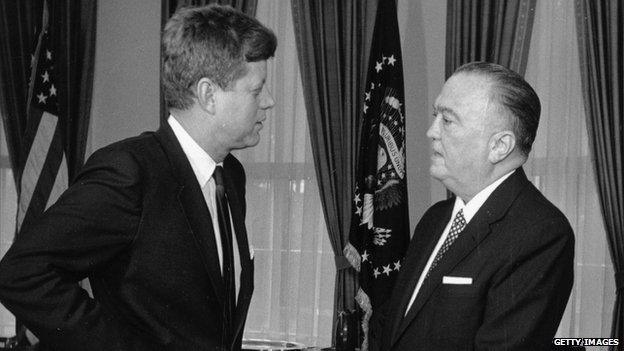FBI threats to MLK prompt snooping warnings
- Published
- comments

A disturbing, decades-old letter sent to Martin Luther King Jr by the FBI is serving, for many, as a reminder of the scope and history of US governmental surveillance programmes - and their potential for abuse.
Heavily redacted versions of the 1964 letter have been available for years, but an uncensored copy was recently discovered by Yale historian Beverly Gage. Now revealed are brazen threats to smear King by making details of his numerous extramarital affairs public and hints at an audiotape that may have accompanied the letter.
While the letter is unsigned, a Senate Committee confirmed a decade after it was sent that it had come from the FBI during then-Director J. Edgar Hoover's five-decade-long leadership of the bureau.
In a piece for the New York Times, Gage writes, external that the FBI had originally started monitoring King because of suspected ties to the US Communist Party. But after King began criticising the government for failing to enforce civil rights in the American South and his participation in the 1963 March on Washington, Gage says the range of the FBI's surveillance spread.
While they failed to link King to communism, the wiretaps and bugs in his home, office and hotel rooms did discover a number of extramarital affairs, which many civil rights leaders already knew about.
When FBI officials brought information about King's personal life to journalists, though, the story was largely ignored. In 1964 Congress passed the Civil Rights Act, and King was awarded the Nobel Peace Prize. That year, Hoover condemned King, calling him "the most notorious liar in the country". A few days later, William Sullivan, a deputy to Hoover at the FBI, sent the letter.
"King, like all frauds your end is approaching," the letter, crafted as a message from a disillusioned supporter, reads. "You could have been our greatest leader. You, even at an early age, have turned out to be not a leader but a dissolute, abnormal moral imbecile."
The correspondence ends with a vague threat.
"King, there is only one thing left for you to do," it reads. "You know what it is."
Many, including King at the time he received it, see this as a suggestion that King should kill himself.
Gage writes in her piece that the odd thing about this time period is that the FBI's campaign against King was a spectacular flop. While today King is looked at as a moral ideal, Hoover is wildly unpopular.
"In this context, perhaps the most surprising aspect of their story is not what the FBI attempted, but what it failed to do," she writes.
Although the FBI's attempts to discredit King were unsuccessful, that doesn't mean modern intelligence agencies have given up on similar tactics.

Hoover, seen here with President Kennedy, called King "the most notorious liar in the country"
Nadia Kayyali, writing for the Electronic Frontier Foundation's blog, Deeplinks, says the King letter, external could be a page out of the handbook of the British online intelligence unit dubbed the Joint Threat Research Intelligence Group - a group whose mission is to "destroy, deny, degrade [and] disrupt enemies by discrediting them".
Today, she writes, that translates into rummaging through Facebook chats, embarrassing internet browsing history and emails in order to discredit any leader who threatens the status quo or to blackmail someone into becoming an informant.
"These are not far-fetched ideas," she says. "They are the reality of what happens when the surveillance state is allowed to grow out of control, and the full King letter, as well as current intelligence community practices, illustrate that reality richly."
Salon's Marcy Wheeler writes, external that there are a lot of unknowns when it comes to the intelligence community - including who today's targets are, if they are at the same level of importance as King or how exactly the National Security Agency or the FBI is getting information about them.
But, she writes, we do know that today's spies are more powerful than ever because of technology, and they have more access because so much of our lives are spent online.
"It may take a half-century, as it has with King, to see the fruits of the surveillance the NSA and FBI direct at leaders of groups perceived to be a threat, whether it be Muslims fighting to defend their legal rights or overseas preachers criticising American expansion," she writes. "But we should still be vigilant in insisting that the tactics used with King have no place in this day and age."
And when it comes to what Americans do and don't know, Nick Gillespie says that it's important to consider a wider scope.
"The more we learn about the government these days, the less we can trust it," he writes, external for the Daily Beast.
He adds that it's fitting that the full details of the government's surveillance of King are coming to light in the age of Wikileaks, NSA leaker Edward Snowden and a White House that promised to be the most transparent administration in US history.
"There's a real opportunity for the politicians, the parties and the causes that dare to embrace real transparency - about how legislation is being crafted, about our surveillance programs at home and abroad - as a core value and something other than a throwaway slogan," Gillespie writes. "But as an unbroken thread of mendacity and mischief binds the present to the past, a future in which the government can be trusted seems farther off than ever."
Gage closes her piece by noting that James Comey, the current director of the FBI, keeps a copy of the agency's King wiretap request on his desk "as a reminder of the bureau's capacity to do wrong".
On Tuesday night, the US Senate narrowly voted down, external a measure that would have curtailed the government's ability to search through private phone records. The King request may be a potent symbol of government intrusion, but campaigners today would say it is dwarfed by the thousands of similar orders and warrants being issued by the FBI each year.
(By Kierran Petersen)
- Published1 June 2014
